Businesses have been displaying inaccurate food hygiene ratings, with many lying about them when challenged, an undercover BBC investigation has revealed.
Secret recording captured businesses from small local restaurants to the supermarket chain Sainsbury’s misleading customers with inaccurate Food Standards Agency (FSA) ratings, in what experts say is a nationwide problem.
Over several weeks, the BBC visited dozens of food establishments in east London, following tip-offs that deception about ratings in the area was rife. Where places lied when asked about their ratings, one expert said this amounted to fraud.
Confronted with the evidence, some businesses did not respond at all while others denied any deliberate deception.
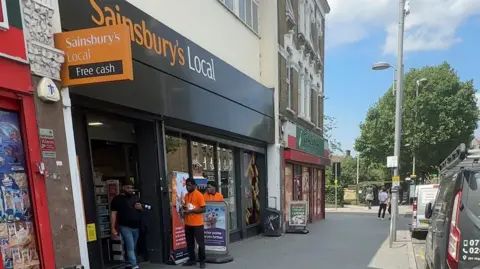
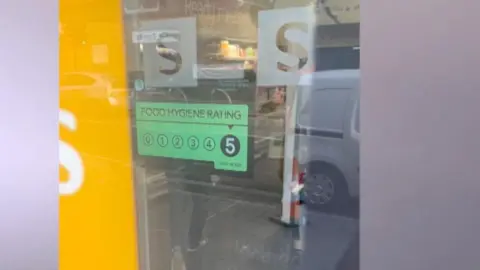
Using hidden cameras, the BBC’s team set out in July and August to document the accuracy of food hygiene ratings on display and also to see how businesses would respond when questioned about their score.
The BBC’s investigation revealed that the London Borough of Waltham Forest has a serious food hygiene problem. As of September 2024, it has the highest percentage of establishments in England and Wales rated zero to two stars on the food hygiene scale. Under the FSA’s scheme, businesses are ranked from zero to five, with those scoring below three described as in need of improvement.
The Sainsbury’s store found to have been misrepresenting its status was one of its “Local” outlets, in Leyton.
A BBC undercover team repeatedly visited the store in July and August and found a top mark of five prominently displayed there. However, its official FSA rating at the time was zero – indicating urgent improvement was needed.
The inspection report, obtained by the BBC through a freedom of information request, detailed serious pest-control issues, with mouse droppings discovered in an access hatch adjacent to a cash machine. Widespread filth and grime were found throughout the store and cleaning standards deemed ‘not acceptable’.
The report noted “excessive dirt and debris beneath shelving, dirty evaporator grills in the walk-in fridge, dirty walls and ceiling in the bakery, dirty lights in the walk-in chiller, and debris in corners of the kitchen and warehouse”.
According to the report, allergen labelling was not available for some products on display – posing a risk to customers with food allergies.
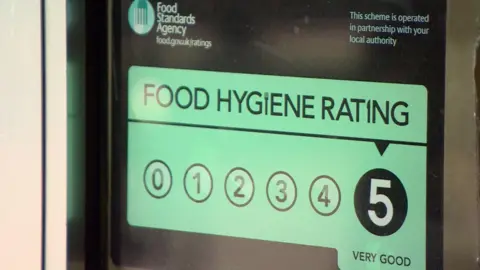
The FSA’s hygiene ratings provide customers with information about the cleanliness and safety practices of establishments that sell food. The ratings are based on factors such as food handling practices, cleanliness of facilities and overall food safety management.
Low scores can indicate issues such as poor cleaning practices, inadequate temperature control of food or pest infestations. Such conditions can lead to bacterial growth, cross-contamination and, ultimately, a higher likelihood of customers falling ill – in some cases seriously.
In response to the BBC investigation, Sainsbury’s said: “Food safety is our highest priority and the vast majority of our stores have a five-star food standards rating, which we proudly display to our customers. We’ve removed an outdated rating sticker at our Leyton High Road Local store and reviewed our procedures to ensure this doesn’t happen again.”
The company admitted that incorrect information was also displayed on the website page for the store and said this had been rectified. Since the BBC visited the store, its rating has improved from zero to three – meaning hygiene there is now “generally satisfactory”.
While the actions of Sainsbury’s raise concerns about misleading customers, other establishments lied about their ratings when asked directly about them, potentially crossing the line into fraudulent behaviour.
One such business was Nadeem Halal Meat & Grocery, in Leyton.
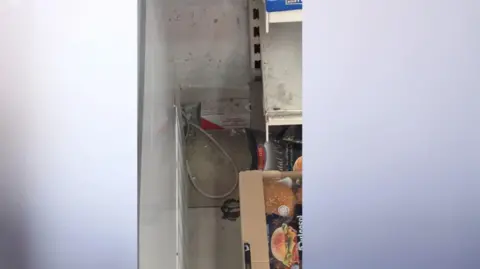
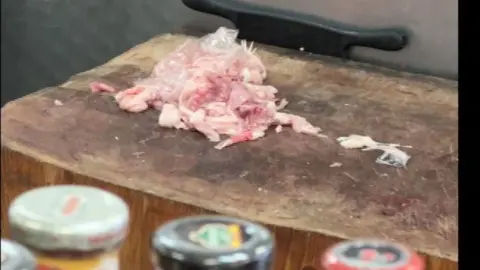
A rating of three was prominently displayed there when BBC undercover reporters visited in July and August. However, the shop’s rating was actually zero.
When questioned, a manager assured our reporter: “Don’t worry, never a problem, never nothing.”
However, the shop’s FSA inspection had found filthy conditions and a lack of food safety awareness among staff.
When the BBC visited, we spotted evidence of a rodent infestation in the form of a trap, indicating the suspected presence of rats or mice.
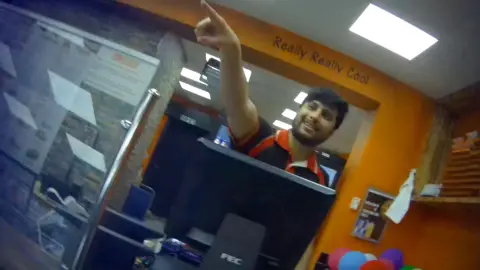
At Café Mondial, in Leyton, the rating of four on display suggested “good” hygiene standards, with a manager there telling our reporter: “Four is good. Nearly five.” In reality, the café had a rating of one.
Its FSA inspection report indicated major hygiene issues and a lack of allergen information.
At Pizza & BBQ Express, in Lea, when an undercover reporter expressed concern about a previous stomach issue, the manager claimed the business had a five-star rating.
“No problem,” he said, encouraging the reporter to “look at the outside” for confirmation of the top mark.
At the time, the business’s rating was zero.
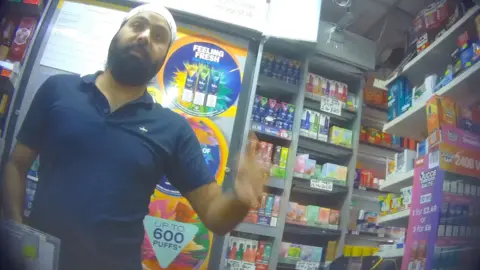
At Midland Supermarket, in Leyton, a five-star rating was prominently displayed, despite the store’s actual score being one.
When questioned, the manager told the BBC: “Five means it’s excellent. One is a low. Zero is the lowest. Five is top class.”
What he failed to mention was that FSA inspectors had found the store selling food well past its expiration date, putting customers at risk of consuming potentially dangerous products.

Jon Payne, a food safety lawyer who analysed the BBC’s evidence, said businesses that lied when asked about their food ratings were potentially committing fraud.
“It makes me cross to see there are businesses out there who are willing to flout the law and put people at risk,” he said.
“The BBC investigation has quite clearly shown that there are a lot of people out there who are willing to break the law. Those that have lied about their food hygiene ratings are committing criminal offences; they are effectively criminals.”
He added: “Where there is a deliberate attempt to deceive a customer, that’s where it’s fraud. They know about it, they’ve done nothing about it. That’s fraud.
“Dealing with food is a serious matter. Anybody who is selling food is providing a customer with something that they put into their body and ultimately can kill them.”
He pointed out that the issue is far from one isolated to east London.
“This happens throughout the country,” Mr Payne told the BBC. “I and many other lawyers come across this every few months at work. And it’s not just limited to small establishments, it can happen in bigger premises as well.”
‘I passed out on the bathroom floor’
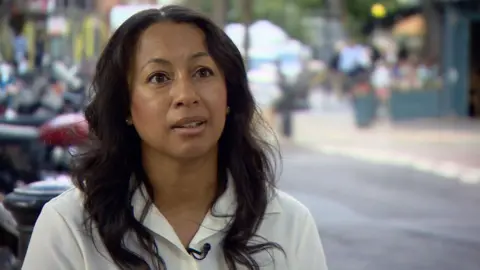
Selena Green’s experience illustrates the dangers of poor food hygiene. After eating a chicken pastry at an unrelated establishment displaying a five-star rating, she became severely ill with what a doctor said was food poisoning.
“I started to feel really, really unwell and laid down,” Ms Green recounted. “Then it was probably about one o’clock in the morning, I made my way to the bathroom because I was just feeling like I wanted to be sick. And I remember I just passed out on the floor in the bathroom and I was starting to go pale.”
The situation quickly became critical. “By that time I was just so weak I couldn’t even move,” she said. “A family member took me into the front room. And I was starting to feel breathless. I was just starting to feel nauseous and I was starting to go pale… and my sister called the ambulance to come and get me.”
Her ordeal culminated in a hospital stay, a stark reminder of the potentially serious consequences when food hygiene standards are compromised.
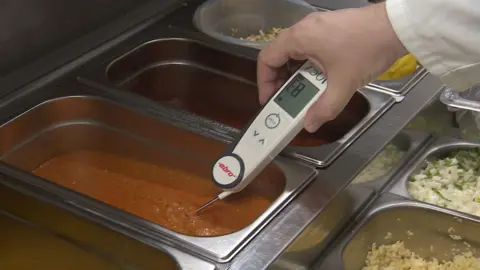
The BBC found 27 businesses that were misleading the public, all within a couple of miles of each other, and approached all of those featured in this article.
Nadeem Halal Meat & Grocery apologised and said it was retraining staff.
Pizza BBQ Express cited staff confusion for the rating discrepancy, denying intentional deception. Its rating has risen to a three since the BBC recording.
Midland Supermarket and Café Mondial did not respond to requests for comment.
‘Voluntary system a problem’
The investigation raises questions about the effectiveness of England’s voluntary display system for food hygiene ratings. Unlike in Wales and Northern Ireland, where displaying a rating is mandatory, English establishments can lawfully choose whether or not to show their ratings – or even display false ones.
Richard Reichman, a consumer protection solicitor, believes the nature of England’s system might be an issue.
“I can see an argument that it would be helpful for businesses to display a food hygiene rating, to make it clear to consumers what their rating is rather than consumers needing to search for that rating online,” he said.
“The voluntary nature of the system in England may be contributing to the problem we’re seeing.”
Waltham Forest Council, which has responsibility for enforcing the kind of trading standards breaches uncovered by the BBC, said it took food hygiene seriously and closed about 50 businesses each year for poor standards. It added that it would investigate any misrepresentation of scores.
The Food Standards Agency said displaying incorrect ratings was potentially illegal. It said its latest audit showed 91% of English businesses displayed the correct ratings, adding that it had long advocated for making the scheme statutory in England – as it is in Wales and Northern Ireland – but that the final decision about that was one for the government.

